1. Probiotics: Balancing Gut Flora
Probiotics are live bacteria that are beneficial for your gut.
These "good" bacteria help maintain a healthy balance of microorganisms in your digestive system, which is essential for proper digestion and gut function. An imbalance of gut bacteria can contribute to bloating, gas, and other digestive issues.
How probiotics help with bloating:
- Improved digestion
Probiotics support the breakdown of food and the absorption of nutrients, which can reduce feelings of fullness and discomfort.
- Reduced gas production
Certain probiotic strains, like Lactobacillus and Bifidobacterium, may help reduce the production of gas, a common cause of bloating.
- Gut health
By supporting a healthy gut microbiome, probiotics can improve overall digestive function and reduce bloating over time.
Best sources: You can find probiotics in fermented foods like yogurt, kefir, sauerkraut, and kimchi. If you prefer supplements, look for products that contain at least 1 billion CFU (colony-forming units) of live bacteria.
Tips: If you’re new to probiotics, try introducing a probiotic-rich food like yogurt or kimchi into your diet this week. Monitor how your digestive system responds!’
2. Digestive Enzymes: Enhancing Food Breakdown
Digestive enzymes are proteins that help break down food into smaller, absorbable components. A study was conducted to show that supplementation of digestive enzyme complex can relieve various common gastrointestinal discomforts3.
How digestive enzymes help with bloating:
- Improved food digestion
Enzymes like lactase (for lactose digestion) or amylase (for carbohydrate digestion) can help break down foods that might otherwise cause bloating, such as dairy or starchy foods.
- Faster digestion
Enzymes can speed up the digestive process, reducing the amount of time food stays in the stomach and intestines, thus minimizing bloating.
Best sources: Digestive enzyme supplements typically contain a blend of amylase, lipase, protease, and lactase to aid the digestion of different food types. Enzyme supplements are available over-the-counter, or you can try papaya and pineapple, both of which contain natural enzymes (papain and bromelain).
Tips: If you often experience bloating after eating certain foods, consider trying a digestive enzyme supplement during your meals and see if it improves your digestion.
3. Peppermint Oil: Soothing Digestive Discomfort
Peppermint oil has been used for centuries as a remedy for digestive issues, including bloating. Its active compound, menthol, has a relaxing effect on the muscles of the digestive tract, helping to relieve spasms and improve overall digestive function4.
How peppermint oil helps with bloating:
- Relieves gas and bloating
Peppermint oil can help relieve bloating by promoting the smooth flow of gas through the intestines.
- Reduces indigestion
It helps soothe an upset stomach and reduce symptoms of indigestion, which are often linked to bloating.
- Muscle relaxation
Peppermint helps relax the muscles in the gut, reducing cramping and discomfort.
Best sources: Peppermint oil is commonly found in enteric-coated capsules, which prevent the oil from being released too early in the digestive tract. You can also sip on peppermint tea for a milder effect.
Tips: Try drinking a warm cup of peppermint tea after meals or take enteric-coated peppermint oil capsules to see if it reduces your bloating symptoms. 4. Ginger: Easing Digestion and Reducing Inflammation
4. Ginger: Easing Digestion and Reducing Inflammation
Ginger is well-known for its ability to alleviate nausea and digestive discomfort. It has natural anti-inflammatory properties and can stimulate the production of digestive enzymes, helping the body break down food more efficiently.
How ginger helps with bloating:
- Stimulates digestion
Ginger can promote the movement of food and gas through the digestive tract, which may reduce bloating.
- Reduces inflammation
If bloating is caused by inflammation in the gut (such as with IBS or other gastrointestinal issues), ginger’s anti-inflammatory properties can help reduce swelling and discomfort.
- Relieves nausea
Ginger is often used as a natural remedy for nausea, which can accompany bloating.
Best sources: Fresh ginger, ginger tea, or ginger supplements are commonly used. You can also incorporate ginger into your meals by adding fresh or powdered ginger to soups, stir-fries, or smoothies.
Tips: Add fresh ginger to your next smoothie or brew a cup of ginger tea to help with digestion and reduce bloating.

5. Fennel Seed: Reducing Gas and Bloating
Fennel seed is another natural remedy often used to treat digestive issues. It has carminative properties, meaning it helps expel gas from the digestive system and reduce bloating.
How fennel seed helps with bloating:
- Relieves trapped gas
Fennel seeds help relax the muscles in the digestive tract, allowing gas to pass more easily and reducing bloating.
- Supports digestion
Fennel can promote better digestion by increasing the flow of bile and encouraging the movement of food through the intestines.
Best sources: You can chew on fennel seeds after meals or brew fennel tea. Fennel supplements are also available for targeted relief.
Tips: Try drinking fennel tea after a heavy meal to ease any bloating and help with digestion.
6. Magnesium: Relaxing the Digestive Tract
Magnesium is an essential mineral that plays a role in many bodily functions, including muscle relaxation and nerve function. When it comes to bloating, magnesium can help by relaxing the muscles of the digestive tract, easing constipation, and promoting regular bowel movements.
How magnesium helps with bloating:
- Relieves constipation
Magnesium can help with constipation by drawing water into the intestines, which softens stools and eases bowel movements.
- Reduces bloating
By improving bowel movements, magnesium can help reduce the discomfort caused by bloating and the sensation of fullness.
Best sources: Magnesium supplements are widely available in various forms, such as magnesium citrate, magnesium oxide, or magnesium glycinate. Foods like leafy greens, nuts, seeds, and whole grains are also rich in magnesium.
Tips: Consider taking a magnesium supplement before bedtime if you experience bloating related to constipation or irregular bowel movements. 7. Curcumin: Anti-Inflammatory Powerhouse
7. Curcumin: Anti-Inflammatory Powerhouse
Curcumin, the active compound in turmeric, has strong anti-inflammatory and antioxidant properties that can calm the digestive tract and reduce bloating caused by inflammation or gut irritation. It’s particularly helpful for those with chronic digestive issues.
How curcumin helps with bloating:
- Reduces Gut Inflammation
Curcumin targets inflammation in the intestinal lining, helping to soothe irritable intestine linings
- Enhances Bile Production
Stimulates the liver to produce bile, which aids in breaking down fats and improving digestion efficiency.
Best sources: Curcumin supplements often comes in capsule or tablets with higher concentrations than daily turmeric. You can also incorporate curcumin by adding turmeric powder or turmeric tea into your meals for that .
Tips: Consume curcumin supplements or curcumin rich-foods with healthy fats for better absorption. Taking with warm water or warm milk helps activate curcumin and improve its efficacy.
Generally, bloating can be uncomfortable and frustrating, but there are several supplements that may help alleviate the symptoms and support better digestion. From probiotics to magnesium, each supplement works in a unique way to reduce gas, ease digestion, and promote a healthy gut. If bloating persists, it’s always a good idea to consult with a healthcare provider to identify any underlying conditions.






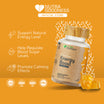




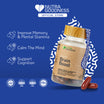


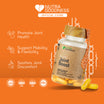

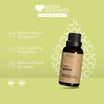
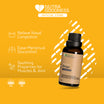


![[Mix & Match] Nutra Goodness NutraAroma Pure Essential Oil 30ml - Peppermint/Lime/Ginger/Tea Tree](http://www.nutragoodness.com/cdn/shop/files/Nutra_Goodness_product_listing_nutra_aroma_mix_2c7cc02f-396c-461e-ad46-0c5f010e5a60.jpg?v=1737706140&width=104)





